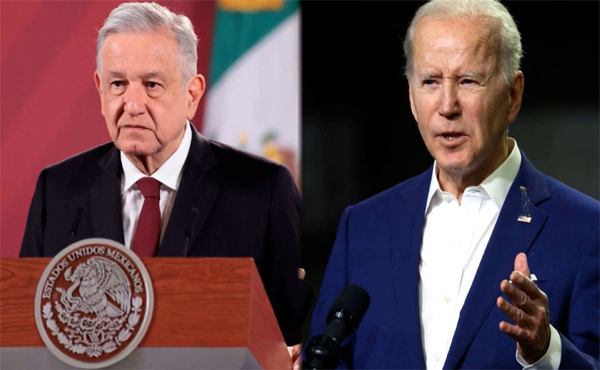
Mexican President Andrés Manuel López Obrador and his U.S. counterpart, Joe Biden, discussed “joint migration management efforts” by phone yesterday, as a growing number of migrants from Venezuela at the U.S.-Mexico border challenges officials in both countries. (Associated Press, Reuters)
Thousands of Venezuelans journeying across Mexico towards the U.S. are now stranded en route due to a new policy that permits U.S. authorities to expel Venezuelans arriving at the border, where they are arriving in record numbers, reports Reuters. Many migrants traveling through Mexico have limited time permits to be in the country, and they are unsure how to proceed. In the meantime, Mexico’s migrant system is overwhelmed.
The Associated Press reports from San Pedro Tapanatepec in southern Mexico, a wayside town where increasing numbers of migrants are stranded as they await transit paperwork in the midst of policy changes.

Haiti
- Haiti is on the verge of collapse due to a series of overlapping crises, including gang warfare, hunger and a growing cholera outbreak, several organizations of civil society told the Guardian. (See yesterday’s post and Monday’s.)
- The discussion over foreign military intervention in Haiti “has been framed almost exclusively as a response to the humanitarian situation,” but “it is impossible to divorce such a mission from the nation’s politics,” writes Jake Johnston at CEPR. “Even putting it on the table appears to be serving the interests of those seeking to prop up an inherently unsustainable status quo.” (See yesterday’s post and Monday’s.)
More Migration
- U.S. authorities are trying to rescue more than 100 migrants — mostly Haitian — stranded during a human smuggling operation that ferried them to Isla Mona, an uninhabited island off Puerto Rico. There were children on board and several of the 63 female passengers traveling on board were pregnant. (Associated Press and Miami Herald)
Venezuela
- The U.S. government will require a grand gesture from Venezuela’s government in exchange for relaxing oil sanctions that prevent Chevron from expanding in the country, reports Reuters. State Department officials demand that the Venezuelan government and opposition returning to election talks in Mexico at least for a first round.
- Attorneys for Nicolás Maduro ally Alex Saab filed a new motion seeking to dismiss U.S. federal money laundering charges, arguing again that he was illegally detained while traveling as a diplomat to Iran, reports the Associated Press.
Regional Relations
- The U.S. Agency for International Development will provide $2 million to help the victims of Hurricane Ian in Cuba, which damaged more than 100,000 homes on the island’s western side. The move is unprecedented for the aid agency, which Cuba’s government accuses of being a CIA surrogate, reports the Miami Herald.
- The Washington Post reports on the illegal abortion movement that has grown quickly in the United States this year. The investigation describes “a pipeline that typically begins in Mexico, where activist suppliers funded largely by private donors secure pills for free as in-kind donations or from international pharmacies for as little as $1.50 a dose. U.S. volunteers then receive the pills through the mail — often relying on legal experts to help minimize their risk — before distributing them to pregnant women in need.”
Mexico
- Mexican President Andrés Manuel López Obrador said that he met with a Walmart exec to lobby for lowering inflation on food products, reports Reuters.
Brazil
- Brazilian presidential frontrunner Luiz Inácio Lula da Silva’s campaign is trying to shore up support in São Paulo state, where incumbent Jair Bolsonaro won by almost seven percentage points in the Oct. 2 first-round vote. The state is representative of some national political trends: while Lula handily beat Bolsonaro in the state capital (47.5% to 38%), the incumbent had an advantage of more than 20 points in the countryside, reports Bloomberg. (See yesterday’s post.)
Chile
- Chile’s Araucanía region has been in a state of emergency for a year due to conflict between indigenous activists, landowners and forestry companies. Though President Gabriel Boric pledged to remove troops on assuming office in March, he was quickly forced to backtrack and has struggled to find a solution to long-standing territorial disputes in the area, reports the Financial Times.
- Chile’s government is preparing measures to boost productivity and stands ready to step up aid to the poor, Finance Minister Mario Marcel told Bloomberg.
- Chilean lawmakers approved a fintech bill, which seeks to regulate fintech and cryptocurrency-related activities in the country, reports Bitcoin.com.
Colombia
- A New York court sentenced Daniel Rendón Herrera, better known as Don Mario, to 35 years in jail. The infamous Colombian paramilitary leader and drug kingpin led the right-wing paramilitary group United Self-Defence Forces (AUC), reports AFP.
Bolivia
- Bolivia’s gold — the country’s top export last year — is mainly produced by small- and medium-scale operations known as “cooperatives.” The cooperatives have significant political clout, which they use to circumvent environmental concerns. Increasingly the operations have encroached on the Amazon’s Madidi national park, reports the Guardian.
Critter Corner
- A rescue program aids trapped pink river dolphins in Bolivia’s Amazon rainforest. The species, believed to be semi-divine creatures by some indigenous groups, has been endangered by steady encroachment along the waterways, reports Reuters.
Jordana Timerman / Latin America Daily Briefing
http://latinamericadailybriefing.blogspot







